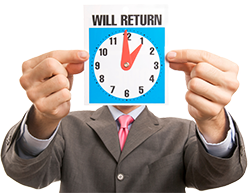Boston small business owners may perceive the continuation of advertising as a luxury right now. This is especially so when compared to the necessity for covering the costs of utilities, inventory, payroll, and rent.
Before pulling the plug, though, business owners from Newburyport to Taunton must consider the consequences of 'going dark', a marketing term which means to stop advertising.
"According to our analysis, short-term decisions to go dark create significant risk for long-term revenue," says Ameneh Atai, Senior Vice President of Commercial Strategy at Nielsen. "This affects both incremental revenue and base sales."
"Our database of long-term effects models suggests that cutting ad spending for the rest of 2020 could lead up-to 11% revenue decrease in 2021," says Ms. Atai. "It could take three to five years of solid and consistent brand building to recover from an extended dark period of media."
"We have a ton of evidence in our historical analysis," adds Nielsen's Tsvetan Tsvetkov, Senior Vice President of Agency and Advertiser Solutions. "Companies that step away from advertising efforts for a period of time, whether it's a couple of quarters or a full year or longer lose the momentum they have built over time the minute they stop. To recover takes a long, long time."
To avoid the economic risks of going dark, local small business owners need to make sure every dollar spent on advertising produces solid returns. By most marketing metrics, advertising on Boston radio could prove to be the best option.
Read More
Topics
retail,
best way to advertise,
reach,
radio advertising,
advertising reach,
roi,
small business owner,
small business,
return on investment,
reach & frequency,
retail sales,
retailer,
retail store
Type "BOSTON REAL ESTATE AGENTS" into Google. In slightly over a half-second, the search will deliver 33,900,000 results. Similar searches for Brookline, Cambridge, Newton, Lexington, Boxborough, or Westford produce a proportional number of returns.
Despite the economic hardships imposed by the Coronavirus crisis on Boston area consumers, the demand for real estate is booming.
The Wall Street Journal published a trend yesterday indicating that mortgage applications for purchasing a home have achieved levels equal to last year.
According to redfin.com, home buying demand is 16.5% higher now than it was pre-COVID-19 on a seasonally adjusted basis.
Redfin attributes this explosive growth in real estate shoppers to two factors, including record-low mortgage rates. The other primary driver is a migration trend from expensive metropolitan areas as buyers hunt for more space at lower prices.
To capture a larger share of the robust market, local real estate agents need to stand apart from the millions of Google results. Advertising on Boston radio will help accomplish this. Here's why.
Read More
Topics
best way to advertise,
newspaper advertising,
small business owner,
online advertising,
social media advertising,
television advertising,
small business,
advertise on radio,
home buyers,
home sellers,
real estate,
streaming audio,
PAY-TV
To slow the spread of COVID-19, the Governor of Massachusetts shut down all but the most essential businesses in the state on March 24. This public safety measure inflicted a severe disruption to the Boston area's $100.9 billion retail economy.
As local small business owners prepare to reopen, each must concentrate on supercharging their cash flows to compensate for nearly 60 days of consumer abstinence. Turning the lights back on and hanging out a welcome sign might not be enough, though, to bring even the most loyal customers back.
Some customers may not return because of personal safety concerns. Other customers may have discovered alternative sources to purchase goods and services.
But, there is one thing every Boston small business owner can be assured of. Consumers will not return if they aren't aware that a business has reopened.
Advertising is a potent tactic for any New England small business that needs to reintroduce itself to local consumers.
“Think you have a great product?” asks the U.S. Small Business Administration. “Unfortunately, no one’s going to know about it unless you advertise.”
Read More
Topics
retail,
best way to advertise,
radio advertising,
retail sales,
retailer,
retail store,
corona,
covid 19,
coronavirus,
crisis marketing,
reopen
COVID-19 has had a profound effect on the retail receipts in New England. Every day small business owners from Newburyport to Quincy are being challenged by the recession created by the pandemic.
Just today, for instance, the US Commerce Department announced that April retail sales were down by 20% vs. the same month last year. This is sure to take an enormous bite out of the $100.9 billion in annual consumer spending Boston area business has been expecting in 2020.
“April was the cruelest month,” Craig Johnson, president of Customer Growth Partners, told the Wall Street Journal. "Retail spending likely bottomed out in the first week of May with spending picking up due to Mother’s Day and gradual state reopenings.
“It’s going to be less worse with each month,” said Mr. Johnson, “as people slowly come out of the foxhole and enter the mainstream of American consumerism.”
The ability of a Boston small business to survive past the lockdowns will depend on the steps it takes now.
WARC, a company that collaborates with more than 50 respected marketing organizations, including the Advertising Research Foundation and the Association of National Advertisers, has identified ten tactics that businesses should implement immediately. The #2 step on this list: Keep advertising if you can.
Read More
Topics
best way to advertise,
small business owner,
small business,
corona,
covid 19,
coronavirus,
recession,
crisis marketing
Pay-TV is struggling to survive COVID-19.
Before the onset of the pandemic, Nielsen reported that 80.4% of Boston area households received their television programs from cable systems, telephone companies, or satellite operators. That number, however, is plummeting.
Pay-TV providers in the Boston area include Xfinity, Dish, Spectrum, and DirecTV.
"Cord-cutting, people dropping their cable and satellite TV subscriptions, pre-dates the onset of Covid-19. But the pandemic is exaggerating the trend, creating deeper issuers for programming that relies on those services for distribution," Eric Savitz wrote last week in Barron's. This includes non-premium services like ESPN, TBS, TNT, USA, CNN, and Discovery.
"LightShed Partners analyst Richard Greenfield counts a loss of 1.96 million subscribers to cable, satellite TV, and virtual cable services combined in the first quarter," Savitz continued. "This is the worst combined quarterly drop ever, down 6% from a year ago."
Greenfield said in an interview with Barron’s that what is especially sobering is that most of the first quarter activity pre-dated the virus. The numbers are likely to get considerably worse in the second quarter.
Read More
Topics
best way to advertise,
radio advertising,
small business owner,
millennials,
television advertising,
small business,
television,
PAY-TV,
DirecTV,
Cable TV,
Dish Network
In January, Boston small business owners were in a panic. The unemployment rate was at a record low 2.6%, and there were not enough workers to fill their open jobs.
As of today, though, Massachusetts is reporting that one-in-four of the state's workforce have lost their jobs for COVID-19 related reasons. Yet, many small business owners are still struggling to find employees.
According to The Wall Street Journal, "For some workers, unemployment benefits are now paying more than their old jobs did. For others, safety concerns or a lack of child care, as most schools and day-care centers remain closed, are making them hesitant to go back."
“That’s going to get in the way of any real recovery,” Douglas Holtz-Eakin, president of American Action Forum and former director of the Congressional Budget Office, told WSJ.
The struggle to hire employees creates an additional threat for those Boston area small business owners who received loans under the SBA's Paycheck Protection Program.
To qualify for the loan forgiveness provision of the PPP, business owners must restore its workforce to pre-Coronavirus levels. This must be accomplished within eight weeks of receiving the monies.
So, just like in January, Boston small business owners are under pressure to fill open jobs. Advertising on Boston radio is a potent way to attract and hire the needed employees.
Read More
Topics
best way to advertise,
radio advertising,
small business owner,
small business,
job boards,
recruitment advertising,
employment advertising,
help wanted
Facebook usage has swelled since the onset of the Covid-19.
According to Nielsen, before the current chaos, 65% of Boston area adults used Facebook each month. This was significantly fewer than were reached by local radio or television each week.
According to the New York Times, however, since the start of the Coronavirus, daily Facebook traffic has increased by 27%. This compares to 33% growth in the amount of time consumers spend listening to local radio during a similar period.
Based on the surge in Facebook consumption, Boston small business owners might be tempted to purchase advertising on the social media platform to augment their regular, free postings. Here are are few facts these businesses should consider before investing.
Read More
Topics
best way to advertise,
radio advertising,
small business owner,
online advertising,
social media advertising,
small business,
facebook advertising,
digital advertising,
facebook,
trust
Business was booming in Boston. Then it was not.
Before the chaos brought on by Coronavirus, it had been predicted, based on estimates from the National Retail Federation, Boston area consumers would spend 4.1% more in 2020 than they did in 2019. On March 24, however, when Massachusetts' Governor shut down the state, the expectations of growth for many small business owners were replaced with fights for survival.
As the state prepares to reopen, Boston area small businesses will learn that turning the lights back on and hanging out the welcome sign might not be enough to bring even the most loyal customers back.
Some customers will not return because of personal safety concerns. Other customers may have discovered alternative sources to purchase goods and services.
More likely, though, customers will not come back because a business has lost a valued parcel of real estate: the position at the top of a customer's mind. This is the place where purchase decisions are made.
There is a way to regain top-of-mind status. First, though, it's important to understand why a business can be forgotten so quickly.
Read More
Topics
best way to advertise,
radio advertising,
small business owner,
small business,
top of mind awareness,
recall,
frequency,
corona,
covid 19,
coronavirus,
recency
For Boston small business owners, marketing and advertising are crucial to surviving any crisis, including Coronavirus. The business literature has an abundance of case studies from depressions, recessions, natural disasters, and, yes, pandemics that affirm this existential conclusion.
Advertising, however, may seem extravagant right now to New England businesses that are struggling to make rent, purchase inventory, and meet payroll. Henry Ford, though, is often quoted as saying, "Stopping advertising to save money is like stopping a clock to save time."
Therefore, as business owners from Mansfield to Haverhill (and every point in between) are cinching their belts tighter-than-ever to stay alive, the dollars invested in advertising must be spent in the most effective manner possible.
During periods of uncertainty, advertising works the hardest when placed in within media that consumers trust. During the time of COVID-19, advertising on Boston radio has earned that trust among local consumers.
Read More
Topics
best way to advertise,
reach,
radio advertising,
small business owner,
small business,
recall,
corona,
covid 19,
coronavirus,
recession,
trust,
context
Since the onset of the Coronavirus crisis, consumers are not flocking into the showrooms, storefronts, offices, or dining rooms of Boston's small business owners. It turns out, though, social distancing has not proven to be an impediment to shopping.
New England consumers are still spending money despite the chaos imposed by the pandemic, according to Gordon Borrell, CEO of Borrell & Associates. His company specializes in the collection of marketing data from business owners across the country.
"During depressions, recessions, floods, hurricane, earthquakes, fires, and, now, pandemics, commerce goes on," Mr. Borell told members of Boston's small business community during a recent teleconference.
To prove his point, he shared research from IBISworld which, indicates spending continues despite a plunge in consumer confidence.
Read More
Topics
radio advertising,
consumer spending,
small business owner,
online advertising,
small business,
corona,
covid 19,
coronavirus,
crisis marketing,
web traffic,
website vistiors,
e-commerce












